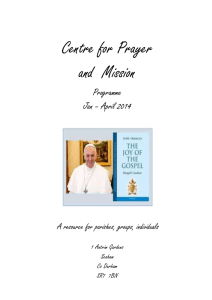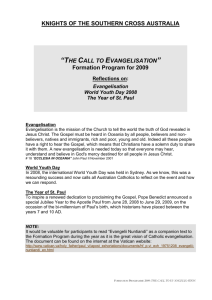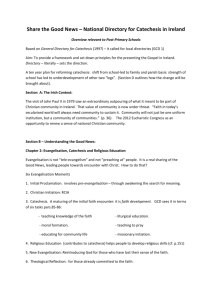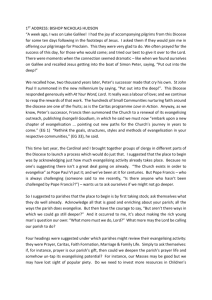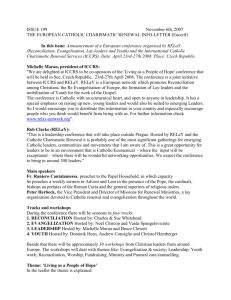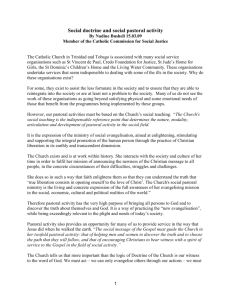new evangelisation - Will Catholic Schools Be Catholic in 2030?
advertisement
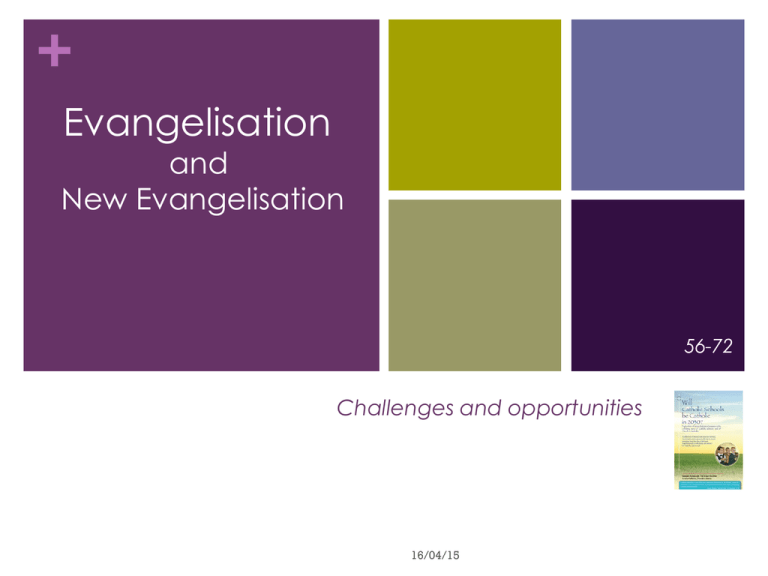
+ Evangelisation and New Evangelisation 56-72 Challenges and opportunities 16/04/15 + Themes Evangelisation and New Evangelisation Challenges and opportunities 16/04/15 Pages 56-72 3 ‘Given Catholic schools as a separate sector of the education landscape in Australia owe their origin to the firmly held conviction of the early clergy and Catholic communities that the school is a partner with parents and church in the handing-on of the faith, or ‘evangelisation’. Though circumstances have changed dramatically, that remains the only + reason to justify the continued existence of Catholic schools as a separate sector. 16/04/15 4 + The school gets this mission from the church, the church gets its mission from Jesus and Jesus is God’s revelation to the world, seeking to renew and sanctify humanity and all creation. The Jesus of justice, mercy, compassion, healing, forgiveness, courage, integrity, faith, hope, and love reveals a loving God with a formula for a better world. 16/04/15 + 5 In recent decades, mainly at the instigation of St John Paul II, the term ‘new evangelisation’ has become common. The content remains the same but the invitation is to change the ‘packaging’, especially in an outreach to baptised Catholics who have become alienated from their faith, and to younger generations growing up in an increasingly irreligious world. Evangelisation continues to mean bringing the Good News of the Gospel to the world. 16/04/15 6 + There lingers an understanding that evangelisation is about ‘bringing them back to the church’ or, ‘bringing them into the church’. Hopefully this remains part of the process. However, a more helpful starting mindset might be that evangelisation is seen as a means of addressing the religious, moral, and spiritual vacuum – that loss of soul - that so impoverishes 21st century Western societies. 16/04/15 + 7 In its aim to achieve a balanced integration of life, culture, and faith, the Catholic school provides a privileged setting as an evangelising community. Drawing from their own faith and spirituality and from their special understanding of the needs and developmental stages of students, staff can normalise Christian living in the Catholic tradition in schools. 16/04/15 8 + Key elements supporting the evangelising dimension of school life include the religious education curriculum, the liturgical and prayer life of the school, the mottos and symbols, the intentional crosscurricular Christian values, social justice outreach, quality of relationships, and collaboration with local Catholic church leaders and communities. Too often in the past the church has presumed that sacramentalisation is the same as evangelisation. Now? 16/04/15 + 9 A major factor in determining the effectiveness of the Catholic school as an evangelising community is the quality of leadership within the school. Leadership that flows from deep personal commitment to the spirit of the Gospel will have strong evangelising impact. Because of the interdependence of the faith and spiritual life of the school and the faith and spiritual life of the staff, it is imperative for systems and schools to develop and to promote programs and experiences in support of ongoing staff formation in this context. 16/04/15 + Reflection and discussion 1 Evangelisation and New Evangelisation Challenges and opportunities 16/04/15 Pages 56-61 + 11 What is your understanding of the terms evangelisation, new evangelisation, sacramentalisation? What distinction do you make between ‘evangelisation’ and ‘sacramentalisation’? Pope Francis named his Apostolic Exhortation ‘Evangelii Gaudium’ -The Joy of The Gospel. In general, what are some common attitudes and practices that (i) militate against this concept? (ii) support this concept? On page 61 there are a number of evangelisation principles given by Canadian religious author and speaker-FR Ronald Rolheiser OMI. Pick two or three of the principles that you find appealing. In a small group, use your choices to have a conversation with colleagues. Any other matters arising from the content of these pages? 16/04/15 + Reflection and discussion 2 Evangelisation and New Evangelisation Challenges and opportunities 16/04/15 Pages 62-72 + Fifty Individually, take time to pick your ‘top 5’ from the 13 Catholic school identity features listed in the pages 62-63 instrument. In groups, compare the preferences chosen and have conversation about any issues arising. Are there issues we need to revisit about our RE curriculum and factors which influence its effectiveness in implementation? How sensitive and responsive are we to the fact that a significant proportion of our students (and staff?) are not of the Catholic faith and are unfamiliar with church traditions? Any need to re-visit policy and practice? What is our shared understanding of catechesis and some indicators of catechesis in action in our school? How do we enable staff to be confident and committed in maintaining our school as a centre of evangelisation? 16/04/15
